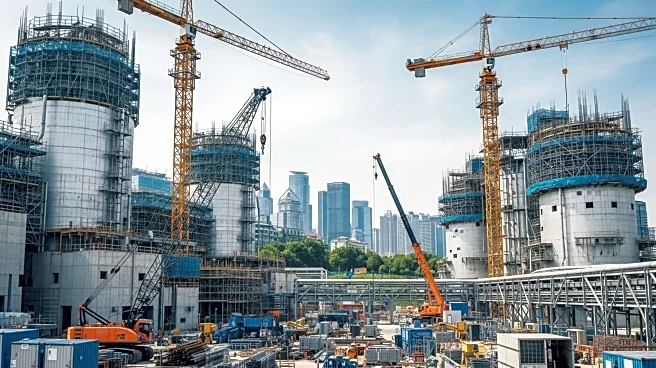What's Happening?
Coca-Cola Europacific Aboitiz Philippines (CCEAP), a collaboration between Coca-Cola Europacific Partners (CCEP) and Aboitiz Equity Venture Inc. (AEV), has initiated the construction of a new manufacturing facility in Tarlac City. This facility, located on a 42-hectare site within TARI Estate, is set to become one of CCEP's largest manufacturing sites globally. The project is a significant infrastructure investment aimed at expanding Coca-Cola's market presence and supporting local economic development. Sabin Aboitiz, president and CEO of AEV, emphasized the strategic importance of this development in enhancing Coca-Cola's market share and driving industrial growth in Central Luzon. Gareth McGeown, president and CEO of CCEAP, highlighted the project's role in Coca-Cola's long-term strategy in the Philippines, aiming to create job opportunities and support local economic growth.
Why It's Important?
The construction of this manufacturing facility is a major step in Coca-Cola's strategy to strengthen its market position in the Philippines and contribute to the local economy. By establishing one of its largest manufacturing sites in Tarlac City, Coca-Cola is set to create hundreds of jobs, attract related industries, and enhance supply chains, thereby boosting the national gross domestic product. This development signals a commitment to long-term investment in the region, potentially leading to increased industrial activity and economic growth. The partnership between CCEP and AEV, following their acquisition of Coca-Cola Beverages Philippines Inc., underscores the strategic importance of the Philippines in Coca-Cola's global operations.
What's Next?
As the construction progresses, stakeholders can anticipate further developments in local infrastructure and job creation. The facility is expected to attract additional industries to the region, enhancing the economic landscape of Central Luzon. Coca-Cola's continued investment may lead to further expansions and collaborations with local governments and businesses, fostering a robust industrial environment. The successful completion of this project could serve as a model for similar investments in other regions, promoting sustainable economic growth across the Philippines.
Beyond the Headlines
This development highlights the broader implications of multinational corporations investing in local economies. It raises questions about the balance between global business interests and local economic benefits, as well as the environmental impact of large-scale manufacturing facilities. The project could also influence cultural dynamics by integrating global brands into local communities, potentially affecting consumer behavior and market trends.









